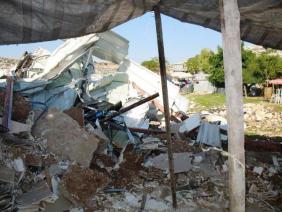'Azzun, Habla, Visits to Villages, Wed 7.12.11, Afternoon

Translator: Hanna K.
Destruction in the Bedouin village Arab Ar-Ramadin
13:30 Habla – A tractor and a truck loaded with plants leave the village. 7 pedestrians are waiting to go in. It is quite in the area. There is nothing exceptional.
The door of the building above the well is open and we enter. We meet A. who is responsible for the coordination between the DCO and the plant nurseries, lives in Kalkilya, is the owner of a plant nursery and moreover is responsible for the 5 wells in the area. He tells us that the well isn't connected to the electricity and is therefore activated by diesel oil which is much more expensive. Each farmer has to pay 2000 Shekels for water instead of 400 Shekels he would have had to pay had the well been connected to the electricity. There is underground water in the wells, which date from the thirties, serve all the farmers in the area and he cannot understand why the civil authority prevents them from connecting an electrical cable (3 phases) from the electricity pole which is situated 50 meters from the well.
He speaks fluent Hebrew and we continue our conversation with him and ask about other problems, and he tells us that soldiers destroyed on Monday two building in the Bedouin villagte of Arb A-Ramadin.
The childrens bus leaves at 13:55and we follow it to the village.
14:10 Arab Ar-Ramadin. At the entrance we meet a local Bedouin and he leads uf to the two houses which have been destroyed by the IDF. On Monday at 07:00 fifty soldiers arrived at the village on two jeeps and two tractors which immediately began the destruction work. A warning had been given a week before, but on Monday morning the inhabitants we removed from their houses and were not given the chance of taking out the house's contents. In one house live a couple and seven children and in the other a couple and ten children. Furniture, clothes, toys, electrical appliances, textbooks etc. – everything turned immediately into a rubbish heap. The army's claim was that the houses were built too close to the road leading to Alfey Menashe. The first house was at a distance of 200 meters from the road, while the second was even farther. The two houses were built by the inhabitants five years ago with an investment of 80.000 Shekels each, and now in the severe cold they are forced to live in tents supplied by the Red Cross. Photos of the galvanized tin walls and crushed plaster , the refrigerator, the gas stove and the teddy bears were put on to the web by Karin .
.
Very near the dwelling place stand three new high voltage electricity poles. Our hosts tell us that the people of Alfe Menashe settlement were against the positioning of the poles near their area for fear that they cause cancer, so they were transferred near the area of the Bedouins. We ask them whether they spoke to anybody? And they answer – who will listen to us??
We left bags of clothes and shoes and left shamefacedly, after promising that we would try to pass the information on to the media in Israel.
15:00 Eliyahu Crossing– about 8 vehicles are waiting in the queue in the direction of Israel.
We turn right to Azzun and continue to Kafr Thulth. We stop near the grocery and the pharmacy. The pharmacist with whom we talked in the past tells us that he still is the only person of his family who got permission to go out to the olive picking. We call J. from Ras Atiya but there is no reply. We decide to drive to the village all the same. With the help of a relative of J. who lives in Israel we reach the council building, but it is closed. We decide to call him and to ask him to prepare for us the list of all the people who didn't receive permissions to go out for the olive picking.
We return all the way to Azzun by way of Abu Salaman and the village of Thulth.
16:35 We take road No. 55 in the direction of Qalqiliya and Kfar Saba.
At the Eliyahu crossing (109) we decide to try and take the right side lane which is intended for Palestinians. The soldier who checks people at the CP asks us where we came from and we reply from Alfe Menashe. The barrier is lifted immediately and we pass. We didn't notice any cars that were delayed.
